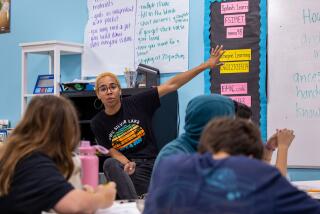As School Ends, the Subject Is Change
- Share via
In the bad morning light, she reads her brother’s seventh-grade yearbook, which is the best way to read a yearbook. In bad light.
“Look at Andrew,” she says, pointing at a picture. “And there’s Shannon.”
The little girl waits till her brother and sister leave for school, then she pounces, grabbing their cherished yearbooks and studying every page.
From four inches away, she examines each face. Only a few she recognizes. But that’s enough. Because there’s something about these yearbooks. A special form of gravity, just drawing her in.
“Look at this kid,” she says with a laugh.
We are in that moment between the lightning and the thunder, the few breathless seconds that separate the end of school from summer vacation, when every meal is takeout pizza and every nose is buried in a book. Math books. History books. Yearbooks.
Summer beckons. It beckons hard. “We want your children,” summer seems to say. “We want them now.”
But first there are the books.
“Look at Matt,” the little girl says, squinting in the shadows.
So I turn on a light for her, which is my first mistake, because the last thing you want to see is the inside of our house on the last week of school.
Everywhere, there are little scraps of paper from the night before. Little slips of notebook paper--the size of gum wrappers--that they used as bookmarks, then let fall to the floor. Or corners of assignments torn off and used for notes.
“Call Brittany,” one says. “Call Ricky Martin,” says another.
It’s like confetti, this stuff. Crinkled scraps from spiral notebooks. Little round dots from the hole punch. You could build a tree from all this paper. If you had the time and the patience, you could build a tree.
“What’s with all this paper?” I mumble, picking up the scraps.
“Look at Mr. Kissel,” the little red-haired girl giggles, holding up the yearbook.
For two weeks it has been this way, a house ransacked by year-end projects and final exams, reports on Henry the Navigator and the Watergate scandal, two topics so ancient that the kids know of only a couple of people old and wise enough to help. Since Cicero is dead, they come to me.
“Dad, who was John Dean?” my lovely and patient older daughter asks one night while preparing her Watergate timeline.
“John Dean was the very first yuppie,” I say.
“I thought he was a Republican,” she says.
“He was a yuppie and a Republican,” I say. “He helped blow the lid off Watergate.”
“What’s Watergate?” my daughter asks.
So I explain what I remember about Watergate, then about yuppies. Then about the Lewinsky scandal and hyperkinetic presidents as a whole, whom you have to beware of because being president of the United States is never enough for hyperkinetic guys like that. They always want more. Which is what gets them into trouble.
“Huh?” she says.
“Watergate was a hotel,” I tell her.
“Thanks, Dad,” she says.
And as the school year comes to a close, I explain about Henry the Navigator and three-digit subtraction and how to do a pie chart in FreeHand 7 and the importance of welcoming change into their lives--new grades, new teachers, new friends.
Outside in the yard, birds are falling from their nests. Inside, they’re falling too. As the century turns and the school year ends, it seems a good time to discuss the great things that await them.
“Successful people embrace change,” I tell them. “Change is exciting. Change is fun.”
And they look at me, impressed that a guy who has parted his hair in the exact same place for 40 years could know so much about change.
“Sure, Dad,” the boy says.
“But I don’t want to leave second grade,” the little girl says, getting kind of misty-eyed.
“Why not?” I ask.
“Because Miss Hamrick,” she says. “I love her.”
“Your teacher?”
“Yes, I love her,” the little girl says.
“What’s the big deal with this Miss Hamrick?” I say to the others, in retrospect probably a poor choice of words.
And the little girl’s eyes get even more misty and her throat kind of wiggles. For a moment, she can’t speak. It is a rare silence. In eight years, she has never not spoken.
“I think I understand,” I finally say.
“Good,” the little girl says.
“Change is overrated,” I say.
“Good,” the little girl says.
“Now, where’s that yearbook?” I say.
Chris Erskine’s column is published on Wednesdays. His e-mail address is chris.erskine@latimes.com.







